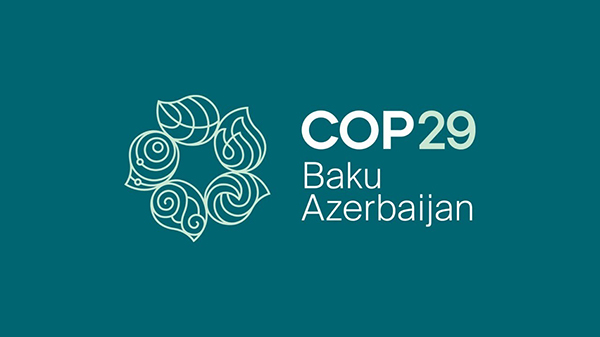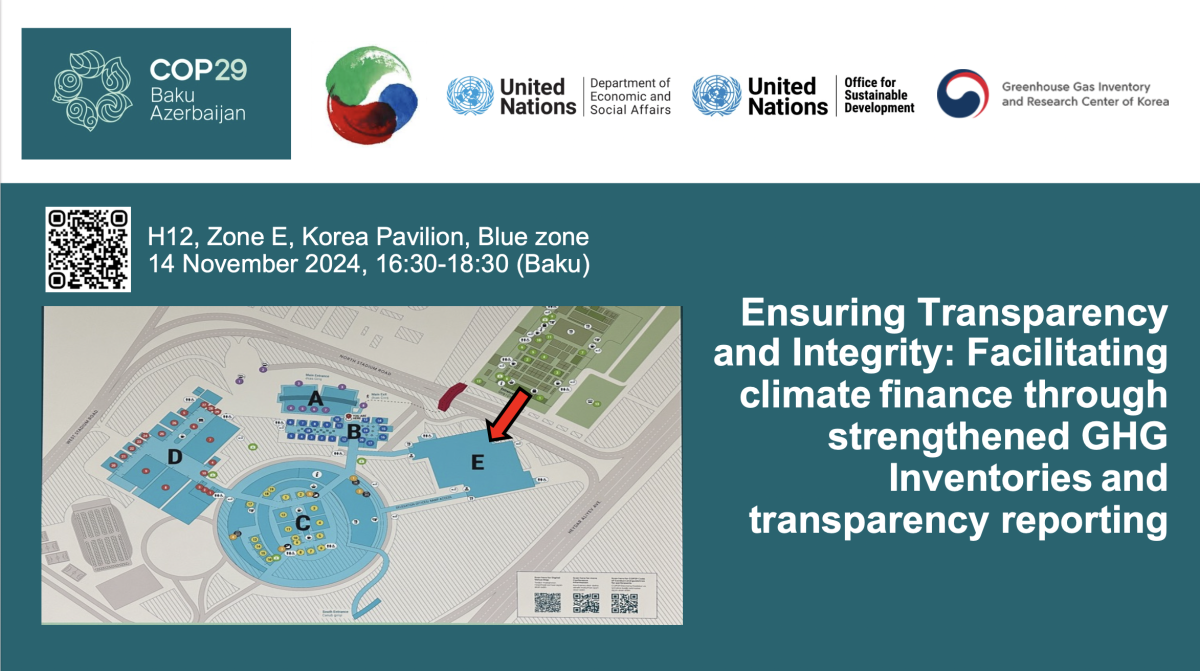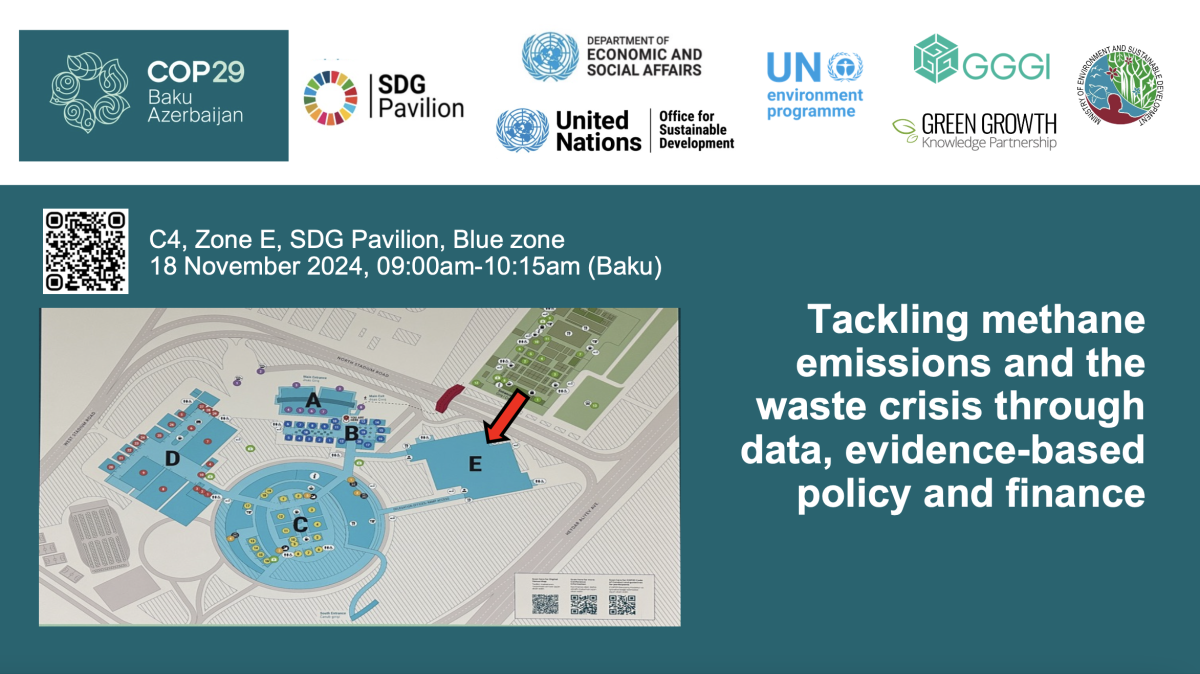[2024] Side Events at UN Climate Change Conference of the Parties (COP 29)

Description
The Conference of the Parties (COP), is held annually, with the Presidency rotating between the five recognised UN regions. This year, Azerbaijan has been selected as the Presidency of the 29th Conference of the Parties (COP29), to be hosted in Baku from 11 to 22 November 2024. Azerbaijan has a strong track record of hosting international events and has chosen Baku Stadium as the venue for COP29. To deliver a process that is transparent, impartial and inclusive, the COP29 Presidency has developed a plan based on two mutually reinforcing pillars to enhance ambition and enable action.
For detailed information, please refer to the following COP29 official website: https://cop29.az/en/home
The United Nations Office for Sustainable Development (UNOSD) will be organizing 2 side events during the United Nations Climate Change Conference of the Parties (COP29). The side events will be a part of the SDG Pavilion hosted by the UN Department of Economic and Social Affairs (UN DESA) and the Korea Pavilion hosted by the Government of Republic of Korea.

Side Event #1
"Ensuring Transparency and Integrity - Facilitating climate finance through strengthened GHG Inventories and transparency reporting"
14 November December 2024 / 4:30 PM - 6:30 PM / H12, Zone E, Korea Pavilion, Blue Zone
Article 6 and Article 13 of the Paris Agreement are interconnected in their aim to enhance transparency, accountability, and collaboration among countries to finance climate action for a 1.5-degree goal. This side-event will explore how market mechanisms and non-market approaches to meet climate targets rests on monitoring, review and verification processes to ensure credible progress towards GHG reduction. The side event will also highlight challenges and national progress in reporting on GHG emissions and mitigation efforts through GHG Inventories, in line with climate finance goals.
Article 6 of the Paris Agreement enables voluntary international cooperation through market and non-market mechanisms to trade emission reductions across borders. Internationally transferred mitigation outcomes (ITMOs) for example allow a country to pay for and achieve GHG reduction targets. For countries to participate in Article 6, they need reliable MRV systems to ensure that the emissions reductions they generate or trade are accurate and verifiable.
Article 13 establishes the Enhanced Transparency Framework (ETF), which requires countries to report on their progress in implementing their Nationally Determined Contributions (NDCs) and other climate-related efforts. The ETF is designed to provide a clear and comprehensive view of global progress on emissions reductions essential for the integrity of climate finance. The transparency framework is critical because it ensures that countries' climate actions are measurable, comparable, and verifiable and assess progress towards global climate goals. However, developing countries require strengthened capacity to ensure the quality of their GHG inventories and transparency reporting to provide credible climate finance.
By improving their GHG Inventories, developing countries can further unlock climate finance trading emissions reductions and receiving investments in mitigation projects. To make these arrangements functional, Article 13’s transparency and reporting requirements help ensure the credibility of GHG emissions reductions to make carbon markets and emissions trading investor ready.
The objective of this side event is to explore practical examples of how the transparency framework under Article 13 supports the accurate accounting, reporting, and verification needed for the effective functioning of carbon markets and cooperative approaches under Article 6 in developing countries. Panelists will underscore how Article 13 includes provisions for capacity building, particularly for developing countries, to strengthen MRV, as public institutions need the technical capacity to generate, track, and report emissions reductions and carbon credits. The side event is organized by UNOSD and Greenhouse Gas Inventory and Research Center of Korea and supported by the Ministry of Environment of Republic of Korea
Youtube Livestreaming: https://youtube.com/live/9vrpKGKBeHg?feature=share
Programme and Agenda
Moderator: Mr. Simon Gilby, Sustainable Development Officer, UNOSD
Opening Remarks
- Mr. Chun Kyoo Park, Head of Office, UNOSD, UN DESA
- Ms. Eunhae (Jay) Jeong, President, Greenhouse Gas Inventory and Research Center (GIR), Ministry of Environment, Republic of Korea
Technical Presentations
- Interlinkages between Article 6 and 13: the importance of MRV for transparent climate finance instruments and carbon markets – Mr. Davor Vesligaj, Programme Officer, Transparency Division, UNFCCC)
- Article 6, National Greenhouse Gas Inventories and the IPCC Inventory Software: a consistent implementation – Mr. Sandro Federici, Head of Science TFI, IPCC TFI TSU
- "Ensuring Credibility and Integrity in Data for Article 6: Addressing Key Challenges for Reliable Climate Reporting" – Ms. Estefania Ardila Robles, Deputy Director of Country Engagement, NDC Partnership
Country Cases
- Republic of Korea - Dr. Jong-chul Bang, Senior Researcher, Greenhouse Gas Inventory and Research Center, Republic of Korea
- Madagascar - Mr. Rivosoa Rabenandrianina, Director General of Sustainable Development, Ministry of Environment and Sustainable Development of Madagascar
- Ghana - Mr. Gyimah Mohammed, Deputy Director, Ministry of Environment Science Technology and Innovation (MESTI), Ghana
- Kazakhstan - Mr. Zufar Tokpayev, General Manager, Greenhouse Gas Inventory Department JSC "Zhasyl Damu"

Side Event #2
"Tackling methane emissions and the waste crisis through data, evidence-based policy and finance"
18 November December 2024 / 9:00 AM - 10:30 AM / C4, Zone E, SDG Pavilion, Blue Zone
Tackling waste management can simultaneously reduce methane emissions, with immediate impacts for climate action and multiple targets across the Sustainable Development Goals. Waste contributes to 20% of human-caused methane emissions. Methane is a potent greenhouse gas, and much of its emissions come from organic waste decomposition in landfills, agricultural practices, and fossil fuel production.
Developing countries face unique challenges in addressing their growing methane emissions, especially in attracting finance to adopt innovative technologies and management systems to address growing emissions from municipal solid waste.
Humanity generates an estimated 2.1 billion tons of municipal solid waste (MSW) annually and waste generation could rise by more than 77% by the end of 2050. Globally, 62% of this solid waste is managed in controlled facilities. Tackling methane emissions and the waste crisis requires a multifaceted approach, and innovative finance mechanisms play a pivotal role in driving scalable solutions. Climate finance is essential for developing countries to rapidly reduce methane emissions, but this also rests on the importance of credible data and evidence-based policy.
Low-income countries face particular challenges, with approximately 90% of waste discarded in unregulated dumps or burned openly and limited access to finance to tackle this challenge. Inadequate data potentially underestimates the waste crisis and limits the reach and impact of policy for many low-income countries and the ability to address negative environmental externalities.
Therefore, this side event will examine the interlinkages between climate change and solid waste management with a focus on data and finance to advance evidence-based policy action. The side event will present a new policy support initiative developed in cooperation with the UNEP co-hosted Green Growth Knowledge Partnership (GGKP) and in coordination with regional hub countries and partners to strengthen waste-related data, national capacity and policy action.
Co-organizers: United Nations Department of Economic and Social Affairs, UN Office for Sustainable Development, Green Growth Knowledge Partnership co-hosted by UN Environment Programme and Global Green Growth Institute, Ministry of Environment and Sustainable Development of Madagascar.
Programme and Agenda
Moderator: Ms. Sara Castro-Hallgren, Sustainable Development Officer, UNOSD
Opening Remarks
- Mr. Chun Kyoo Park, Head of Office, UNOSD, UN DESA
Keynote Speech
- H.E. Mr. Max Andonirina Fontaine, Minister of Environment and Sustainable Development, Madagascar
Presentations
- Launch of the Waste Policy Support Platform and Publication - "The Waste Crisis: Accelerating National to Local Policy Action and Evidence-based Strategies for Sustainable Solutions"
Panel Discussion
- Ms. Aditi Ramola, Director, International Solid Waste Association (ISWA)
- Mr. Godfred Fiifi Boadi, Senior Programmes Manager for Solid Waste, Ministry of Sanitation and Water Resources of Ghana
-
Ms. Amy Lewis, OperaSons Senior Specialist, Climate Change Division, Inter-American Development Bank

